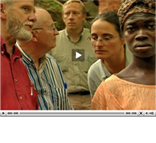
Katrina Browne, Producer/Director/Writer, Traces of the Trade: A Story from the Deep North
Ms. Browne currently serves as a consultant on the staff team of the Episcopal Church’s Becoming Beloved Community efforts – the Church’s initiatives on racial healing, justice, and reconciliation. She has authored a 10-session race dialogue series for congregational use. The Sacred Ground curriculum is built around a series of documentary films and readings that walk through the U.S.’s history of race, racism, and specifically, whiteness.
Ms. Browne also works as a freelance speaker/educator/facilitator in connection with Traces of the Trade. She initiated the film in response to her discovery that her Rhode Island forefathers were the largest slave-trading family in U.S. history. She and nine relatives retrace the Triangle Trade, from Rhode Island, to Ghana, to Cuba, uncovering the vast extent of Northern complicity in slavery, and grappling with questions of “repair” today. Several hundred people shared their talents as part of the filmmaking and dialogue process over nine years. While still in rough-cut form, the film contributed to the Episcopal Church’s 2006 decision to atone for its role in slavery.
Traces premiered in 2008 at the Sundance Film Festival, and then aired nationally on PBS’s premier showcase of documentary film –P.O.V.– reaching over 1.4 million Americans. The film received extensive press coverage, including The New York Times; The Washington Post; AP Newswire and Gannett News Service; The Early Show on CBS; Bill Moyers’ Journal on PBS; and NPR stories. Ms. Browne and the rest of the film’s research team were nominated for an Emmy Award. Ms. Browne received the Women Film Critics’ Courage in Filmmaking Award and the Council on Foundations Henry Hampton Film & Video Award. She and her colleagues secured major funding for the film and its distribution from the Ford Foundation, the Kellogg Foundation, the Wyncote Foundation and many others.
Ms. Browne has traveled extensively with Traces since the film’s release – in the U.S. and overseas – as a public speaker, facilitator and trainer. She has presented/co-presented in schools, colleges and universities, museums and historic sites, religious congregations and conventions, workplaces and professional conferences. Some highlights include screenings for foundation executives at the Council on Foundations conference; the State Legislature of Connecticut and on Capitol Hill as part of Congressional Conversations on Race; the Samuel DeWitt Proctor Conference; the Union of Black Episcopalians; several denominational conventions; the US Coast Guard Academy; the National Constitution Center; the UCLA School of Public Affairs; the Rhode Island headquarters of Bank of America; at the United Nations for slavery/slave trade remembrance day; and for state-wide series with state humanities councils.
Traces was selected by the U.S. State Department to be part of the American Documentary Showcase, with screenings hosted by U.S. embassies around the world; and by the Caribbean Traveling Film Festival to tour to numerous Caribbean and Latin American countries. Ms. Browne has presented events with U.S. embassies in the Dominican Republic, Sweden, and at the European Union headquarters. Broadcasts have taken place in Canada, Bermuda and Cuba.
Ms. Browne served from 2010-2013 as founding executive director of the Tracing Center on Histories & Legacies of Slavery – a non-profit formed to deepen the work with schools, public history sites, and religious institutions. She and her colleagues have received accolades for their programs at numerous public and independent schools, their teacher trainings including through state departments of education and humanities councils, and at venues such as the Smithsonian National Museum of African American History and Culture. She was a featured speaker at the National Association of Episcopal Schools Conference. Ms. Browne has an essay in The Transatlantic Slave Trade and Slavery: New Directions in Teaching and Learning, a book that came from a UNESCO international symposium on teaching slavery. Her essay explores the psychological legacies of slavery for white Americans and the implications for how slavery is taught to students of all backgrounds. She is now a member of a task force for a UNESCO/GHFP project: “Healing the Wounds of Slavery.” She contributed to the text panels at the President’s House exhibit on slavery in Philadelphia (where George Washington held enslaved people while serving as the first U.S. President) and to training for National Park Service rangers who work at the Liberty Bell and Independence Hall.
Ms. Browne’s work now includes not only work with the film, but racial awareness training more broadly. She was one of the trainers engaged by the Smithsonian National Museum of African American History and Culture to provide training for volunteer docents and visitor services staff prior to the Museum’s opening. She served as a “healing practitioner” for the Kellogg Foundation’s America Healing initiative. She also leads work on whiteness through highly accessible forms of dance, movement and storytelling via InterPlay.
Prior to producing Traces, Ms. Browne served as Outreach Planning Coordinator for the film adaptation of Anna Deavere Smith’s award-winning play about the L.A. riots: Twilight: Los Angeles. In her twenties she co-founded Public Allies, an AmeriCorps program now operating in 24 cities. She has an M.A. in Theology (Ethics) from the Pacific School of Religion where she wrote a thesis on film and civic dialogue.
